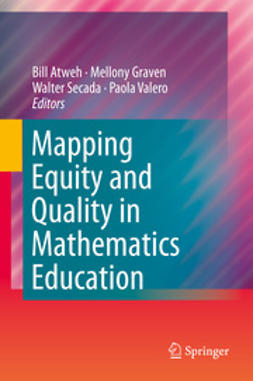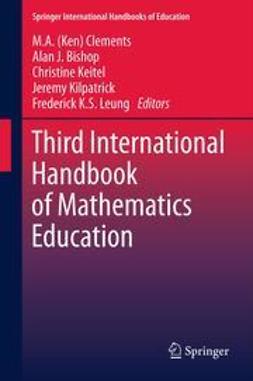Forgasz, Helen
Towards Equity in Mathematics Education
1. Introduction
Ferdinand Rivera, Helen Forgasz
2. Preface to “Moving Towards a Feminist Epistemology of Mathematics”
Diana B. Erchick
3. Moving Towards a Feminist Epistemology of Mathematics
Leone Burton
4. Preface to “Equity in Mathematics Education: Unions and Intersections of Feminist and Social Justice Literature”
Laura Jacobsen
5. Equity in Mathematics Education: Unions and Intersections of Feminist and Social Justice Literature
Laura Jacobsen Spielman
6. Preface to “Adolescent Girls’ Construction of Moral Discourses and Appropriation of Primary Identity in a Mathematics Classroom”
Jae Hoon Lim
7. Adolescent Girls’ Construction of Moral Discourses and Appropriation of Primary Identity in a Mathematics Classroom
Jae Hoon Lim
8. Shall We Do Politics or Learn Some Maths Today? Representing and Interrogating Social Inequality
Paul Dowling, Jeremy Burke
9. Commentary on the Chapter by Paul Dowling and Jeremy Burke, “Shall We Do Politics or Learn Some Maths Today? Representing and Interrogating Social Inequality”
Bill Atweh
10. Commentary on the Chapter by Dowling and Burke, “Shall We Do Politics or Learn Some Maths Today? Representing and Interrogating Social Inequality”
Joanne Rossi Becker
11. Gender Role Stereotypes in the Perception of Mathematics: An Empirical Study with Secondary Students in Germany
Gabriele Kaiser, Maren Hoffstall, Anna B. Orschulik
12. Commentary on the Chapter by Gabriele Kaiser, Maren Hoffstall and Anna B. Orschulik, “Gender Role Stereotypes in the Perception of Mathematics—Results of an Empirical Study with Secondary Students in Germany”
Sarah Theule Lubienski
13. Commentary on the Chapter by Gabriele Kaiser, Maren Hoffstall, and Anna B. Orschulik, “Gender Role Stereotypes in the Perception of Mathematics: Results of an Empirical Study with Secondary Students in Germany”
Colleen Vale
14. Students’ Attitudes, Engagement and Confidence in Mathematics and Statistics Learning: ICT, Gender, and Equity Dimensions
Anastasios N. Barkatsas
15. Commentary on the Chapter by Anastasios Barkatsas, “Students’ Attitudes, Engagement and Confidence in Mathematics and Statistics Learning: ICT, Gender, and Equity Dimensions”
Kenneth Ruthven
16. Commentary on the Chapter by Anastasios Barkatsas, “Students’ Attitudes, Engagement and Confidence in Mathematics and Statistics Learning: ICT, Gender, and Equity Dimensions”
Hazel Tan
17. Preface to “Israeli Jewish and Arab Students’ Gendering of Mathematics”
David Mittelberg, Helen Forgasz
18. Israeli Jewish and Arab Students’ Gendering of Mathematics
Helen J. Forgasz, David Mittelberg
19. Preface to “Ethnomathematics and Philosophy”
Bill Barton
20. Ethnomathematics and Philosophy
Bill Barton
21. Preface to “Cultural Differences, Oral Mathematics and Calculators in a Teacher Training Course of the Brazilian Landless Movement”
Gelsa Knijnik, Fernanda Wanderer
22. Cultural Differences, Oral Mathematics, and Calculators in a Teacher Training Course of the Brazilian Landless Movement
Gelsa Knijnik, Fernanda Wanderer, Claudio José Oliveira
23. Preface to “Immigrant Parents’ Perspectives on Their Children’s Mathematics Education”
Marta Civil, Núria Planas, Beatriz Quintos
24. Immigrant Parents’ Perspectives on Their Children’s Mathematics Education
Marta Civil, Núria Planas, Beatriz Quintos
25. Mathematics Education for Adults: Can It Reduce Inequality in Society?
Wolfgang Schlöglmann
26. Commentary on the Chapter by Wolfgang Schlöglmann, “Mathematics Education for Adults: Can It Reduce Inequality in Society?”
Tine Wedege
27. Commentary on the Chapter by Wolfgang Schlöglmann, “Mathematics Education for Adults: Can It Reduce Inequality in Society?”
Jaguthsing Dindyal
28. Heteroglossia in Multilingual Mathematics Classrooms
Richard Barwell
29. Commentary on the Chapter by Richard Barwell, “Heteroglossia in Multilingual Mathematics Classrooms”
Núria Planas
30. Commentary on the Chapter by Richard Barwell, “Heteroglossia in Multilingual Mathematics Classrooms”
Luis Radford
31. Preface to “Doubtful Rationality”
Ole Skovsmose
32. Doubtful Rationality
Ole Skovsmose
33. Preface to “A Socio-Political Look at Equity in the School Organization of Mathematics Education”
Paola Valero
34. A Socio-Political Look at Equity in the School Organization of Mathematics Education
Paola Valero
35. Looking for Gold: Catering for Mathematically Gifted Students Within and Beyond ZDM
Gilah C. Leder
36. Commentary on the Chapter by Gilah Leder, “Looking for Gold: Catering for Mathematically Gifted Students Within and Beyond ZDM”
Boris Koichu
37. Commentary on the Chapter by Gilah Leder, “Looking for Gold: Catering for Mathematically Gifted Students Within and Beyond ZDM”
Rosemary Callingham
38. From the Known to the Unknown: Pattern, Mathematics and Learning in Papua New Guinea
Graeme Were
39. Commentary on the Chapter by Graeme Were, “From the Known to the Unknown: Pattern, Mathematics and Learning in Papua New Guinea”
Alan J. Bishop
40. Commentary on the Chapter by Graeme Were, “From the Known to the Unknown: Pattern, Mathematics and Learning in Papua New Guinea”
Steven K. Khan
41. Gender Differences in Mathematics and Science Achievement Across the Distribution: What International Variation Can Tell Us About the Role of Biology and Society
Andrew M. Penner, Todd CadwalladerOlsker
42. Commentary on the Chapter by Penner and CadwalladerOlsker, “Gender Differences in Mathematics and Science Achievement Across the Distribution: What International Variation Can Tell Us About the Role of Biology and Society”
James S. Dietz
43. Commentary on the Chapter by Penner and CadwalladerOlsker, “Gender Differences in Mathematics and Science Achievement Across the Distribution: What International Variation Can Tell Us About the Role of Biology and Society”
Robert (Bob) Klein
44. Research-Based Mathematics Instruction for Students with Learning Disabilities
Marjorie Montague, Asha K. Jitendra
45. Commentary on the Chapter by Marjorie Montague and Asha Jitendra, “Research-Based Mathematics Instruction for Students with Learning Disabilities”
Ann Dowker
46. Commentary on the Chapter by Marjorie Montague and Asha Jitendra, “Research-Based Mathematics Instruction for Students with Learning Disabilities”
Delinda Garderen
47. Neural Correlates of Gender, Culture, and Race and Implications to Embodied Thinking in Mathematics
Ferdinand Rivera
48. Commentary on the Chapter by Ferdinand Rivera, “Neural Correlates of Gender, Culture, and Race and Implications to Embodied Thinking in Mathematics”
Bert Smedt, Lieven Verschaffel
49. Commentary on the Chapter by Ferdinand Rivera, “Neural Correlates of Gender, Culture, and Race and Implications to Embodied Thinking in Mathematics”
Stephen R. Campbell
Keywords: Education, Education (general), Gender Studies, Mathematics Education, Cultural Studies
- Author(s)
- Forgasz, Helen
- Rivera, Ferdinand
- Publisher
- Springer
- Publication year
- 2012
- Language
- en
- Edition
- 2012
- Series
- Advances in Mathematics Education
- Page amount
- 18 pages
- Category
- Upbringing, Education
- Format
- Ebook
- eISBN (PDF)
- 9783642277023










